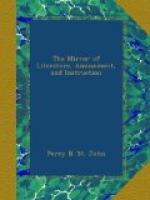The female children of genteel parentage are, in Genoa, allowed to visit amongst themselves in balls and fetes, until they have attained the age of fourteen; when, being considered marriageable, instead of “coming out” as in England, they are kept strictly at home; allowed indeed to see a little company there, but there only, except when taken per favour, once or twice to the opera, to which they go purposely in an undress, sit at the back of the box, so as not to be seen, or if accidentally beheld, they are not to be recognised. When a girl reaches the appointed years of discretion, the sole consideration of her parents is, to marry her, and in this matter she, poor thing, has no voice, as I shall proceed to prove. Negotiating matches, making proposals, and arranging marriages, are affairs confided to the prudence and mediation of certain busy old ladies, who find their account in bringing about weddings, since they receive a regular per centage upon them. One of these emissaries of Hymen will call on a parent who has a son, reported to be an eligible match, and open the business by talking of the young man, until an opportunity occurs of inquiring whether he is not soon to be settled, and how much will be allowed him? These queries being answered to the good lady’s satisfaction, she proceeds a step further, and enumerates the principal families of her acquaintance, who have daughters to dispose of, adding an accurate description of each Signorina’s person, connexions, property, expectancies, and other advantages. A lady having been selected as an eligible match for the youth, the parents on both sides being agreed, and the young gentleman duly informed of their arrangements for his happiness, he is allowed to commence paying his addresses to the fair one, by sending her a large, and peculiarly constructed bouquet, the acceptance of which, is in fact an acceptance of himself, and the girl is immediately considered a Sposina, or betrothed one. The bouquet, and herself, in full dress, are forthwith carried to the opera, where the former is laid, and the latter seated, immediately in front of the box; when, numerous are the eyes and glasses levelled at the new Sposina, upon this her first appearance in public. On this interesting and trying occasion, her accepted lover stands during the performance behind her chair, and is assiduous in his attentions. The next amusement at which, according to etiquette the Sposina appears, is a ball, to which she goes attended by her lover, and one or both of her parents. The bouquet, the emblem of her engagement goes with her, which never quits her hand, except when she dances, and is then laid on her seat, until her return. She is not allowed to dance with any one but her brother, intended husband, or his most intimate friend to whom perhaps as a favour, he may choose to introduce her. The duty of the engaged man is, to present his Sposina every morning up to the period




